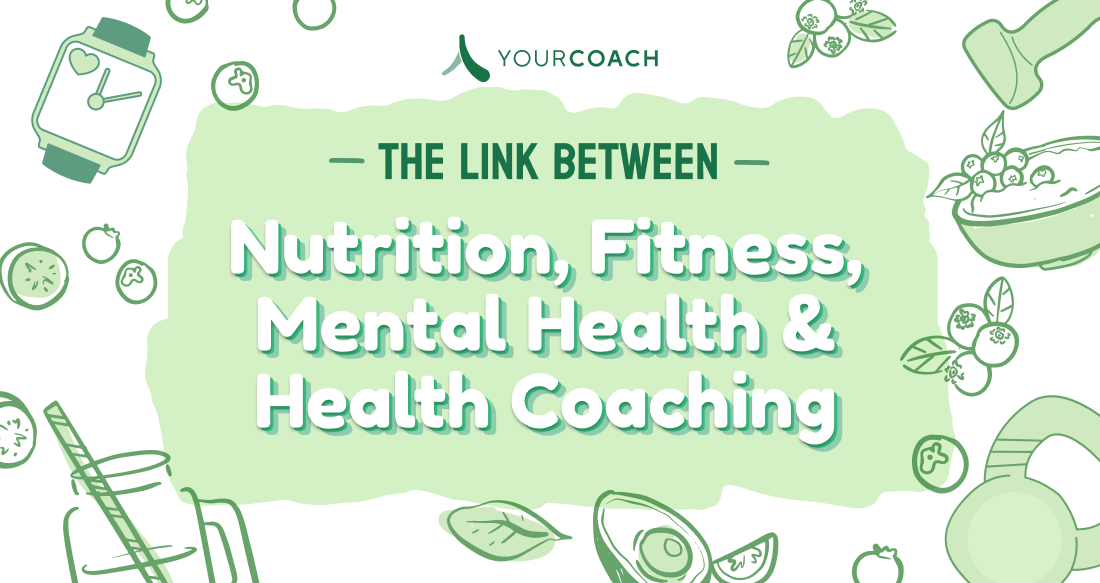
When setting your goals, it’s important to have a focus—to know exactly what you want to improve about your health and why. One of the most common mistakes we see, though, is when people focus too narrowly on one specific goal and fail to recognize how deeply connected health & wellbeing elements like nutrition, fitness and mental health are.
For example, if you’re intently focused on losing weight and decreasing that number on the scale, you might look to address your diet and maybe even try to get some more movement in your day-to-day life. While that is a great start, it is only half the battle. Nurturing a positive mindset and cultivating an understanding of the mental health factors that have historically impeded your weight loss journey or alternatively, are there to tap into for seeing better results is critical to achieving your goals with sustainable progress and lasting results.
Health coaches are dot connectors. They help you step outside yourself and see the bigger picture. They’re trained to understand how mental health lays the foundation for more optimal success across health & wellbeing components like nutrition and fitness and help you appreciate how things like nutrition and fitness can have a scientifically-proven positive effect on your mental health. In today’s blog, we take a closer look at these points of connection, demonstrating what it means for health coaches to provide long-term health support that’s truly holistic.
Nutrition, Mental Health & Health Coaching
On the one hand, prioritizing better nutrition can have a scientifically-backed impact on our mental health in the long-run. Mental health and nutrition are so intrinsically connected that 95% of the body’s serotonin, the neurotransmitter responsible for regulating mood as well as sleep, digestion and other processes, is actually produced in the gastrointestinal tract. When comparing “traditional diets” to a Mediterranean diet (a diet rich in fruits and vegetables, healthy fats, legumes and seafood), some studies have shown depression decreased by up to 35%. Moreover, certain nutritional deficiencies have been linked to symptoms of depression and even dementia. We’ve been steady proponents of the concept of “food as medicine” (check out our podcast episode on this very topic here).
On the other hand, prioritizing your mental health can make it significantly easier to make better food choices, when possible. When mental health conditions are not well managed, they can contribute to poor eating habits, negatively affecting mental health and perpetuating a vicious cycle. Studies have closely linked poor eating patterns—from meal skipping to prioritizing snacking and convenience—with emotional disorders. Similarly, poor dietary habits have been associated with depression, specifically.
Health coaches help individuals understand the scientific basis that is the connection between nutrition and food. They work closely to unpack how these two components of wellbeing interplay in your day to day life and can fundamentally shift your holistic approach, helping you finally achieve success in your health & wellbeing goals. Building on their role as dot-connectors, coaches can also collaborate closely with health and care teams to ensure existing mental health conditions receive comprehensive support. This collaboration can include assisting with medication adherence, navigating the healthcare system, and seamlessly integrating clinician-recommended plans, fostering a holistic approach to well-being.
Fitness, Mental Health & Health Coaching
Similarly, pursuing a healthy level of physical fitness has been linked to statistically better mental health outcomes. Exercise has been shown to release endorphins, provide a necessary reprieve from stressful situations, build confidence, and so much more. Evidence even suggests exercise can help promote better sleep and reduce symptoms associated with anxiety and depression. The list of exercise-related health benefits could truly fill a whole blog in and of itself! On the other hand, certain mental health conditions can make a physically active lifestyle quite difficult. For example, depression can cause low energy levels, making exercise feel less possible. Others might feel uncomfortable working out in a group setting and might otherwise not know where or how to get started.
Health coaches get to know you – your preferences, your goals, and your unique needs. They meet you exactly where you are on your journey, whether you’re simply curious about how exercise can benefit you or you’re eager to start moving more. Then, they collaborate with you to craft a personalized plan that bridges your current reality with the healthier, happier future you envision. In a safe and non-judgemental space, they help you see and celebrate the mental health benefits you might be achieving through this process of introducing more movement to your life.
Health coaches understand that without taking time to get to know the whole person and the many ways their physical, emotional and psychosocial wellbeing intersect, you can’t ever help them achieve their healthiest, happiest selves. Here at YourCoach we’re grateful to work alongside our Industry Partners to deliver the power of health coaching to their employees, clients and members. If you’d like to learn more about what this could look like for your organization, send us a note at team@yourcoach.health.


